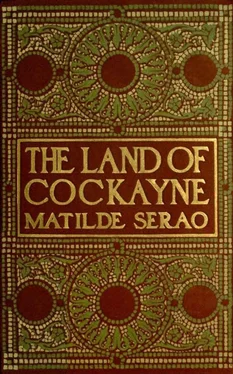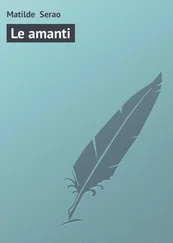Matilde Serao - The Land of Cockayne
Здесь есть возможность читать онлайн «Matilde Serao - The Land of Cockayne» — ознакомительный отрывок электронной книги совершенно бесплатно, а после прочтения отрывка купить полную версию. В некоторых случаях можно слушать аудио, скачать через торрент в формате fb2 и присутствует краткое содержание. Жанр: unrecognised, на английском языке. Описание произведения, (предисловие) а так же отзывы посетителей доступны на портале библиотеки ЛибКат.
- Название:The Land of Cockayne
- Автор:
- Жанр:
- Год:неизвестен
- ISBN:нет данных
- Рейтинг книги:3 / 5. Голосов: 1
-
Избранное:Добавить в избранное
- Отзывы:
-
Ваша оценка:
- 60
- 1
- 2
- 3
- 4
- 5
The Land of Cockayne: краткое содержание, описание и аннотация
Предлагаем к чтению аннотацию, описание, краткое содержание или предисловие (зависит от того, что написал сам автор книги «The Land of Cockayne»). Если вы не нашли необходимую информацию о книге — напишите в комментариях, мы постараемся отыскать её.
The Land of Cockayne — читать онлайн ознакомительный отрывок
Ниже представлен текст книги, разбитый по страницам. Система сохранения места последней прочитанной страницы, позволяет с удобством читать онлайн бесплатно книгу «The Land of Cockayne», без необходимости каждый раз заново искать на чём Вы остановились. Поставьте закладку, и сможете в любой момент перейти на страницу, на которой закончили чтение.
Интервал:
Закладка:
CHAPTER I – THE LOTTERY DRAWING
The afternoon sun crept into the Piazzetta dei Banchi Nuovi, broadening from Cardone's, the engraver, to Cappa's, the chemist, lengthening on from there up the whole Santa Chiara Road, spreading a light of unusual gaiety over the street, which always wears, even in its most frequented hours, a frigid, claustral aspect. But the great morning traffic, of people coming from the northern districts of the town—Avvocata, Stella, San Carlo all' Arena, San Lorenzo—to go down to the lower quarters of Porto, Pendino and Mercato, or vice versâ, had been slowly slackening since mid-day; the coming and going of carts, carriages and pedlars had ceased; everybody seemed to be taking short cuts by the Chiostro di Santa Chiara and the Vico 1o Foglia towards Mezzocannone Alley, the Gesù Nuovo, San Giovanni Maggiore. Presently the sun's brightness lit up a street by then quite deserted. The shopkeepers on the right side of Santa Chiara—as the left side is only the high, dark enclosure wall of the Poor Clares' Convent—dealers in old dusty or wretched mean new furniture, coloured engravings, shiny oleographs, wooden and stucco saints, were at the back of their dark shops, eating over a corner of wine-stained tablecloth, with a caraffe of Marano small wine, closed by a twisted vine-leaf, standing by a big dish of macaroni. The porters, seated on the ground at the shop entrance, were eating lazily at a small loaf of bread, cut in two to hold some tasty viand—fried gourd soaked in vinegar, parsnips in green sauce, pomegranates seasoned with vinegar, garlic and pepper. The sharp, greasy smell of the quantity of tomatoes all this macaroni was cooked in, from one end of the street to the other, mingled with the acute odour of sour vinegar and coarse spices. From some passing fruitseller, carrying a nearly empty basket of figs on his head, or pushing a barrow with purple plums, and tough spotted peaches at the bottom of the baskets, the shopkeepers, clerks and porters, lips still red from tomatoes or shining with grease, bargained for a penny-worth of fruit, to finish their meal; two workmen, in front of the Martello printing-shop, where the small visiting-card press had stopped, deeply coveted a yellow melon; and two seamstresses were waiting on a doorstep chattering, till the seller of pizza passed, which is the shredded rind of tomato, garlic, and wild marjoram, cooked in the oven, and sold at a farthing, a half-penny, a penny, the piece. The pizzaiuolo did pass, in fact, but he was carrying his wooden tray, shining with oil, under his arm, without a bit of pizza; he had sold everything, and was going off to eat his own meal, down to the Porto quarter, where his shop was. The two disappointed seamstresses consulted each other; one of them, a blonde, with a golden aureole round her pale gentle face, moved off with that undulating step that gives an Oriental touch to a Neapolitan woman's charm. She went up Santa Chiara Road, bending her head so as not to get the sun in her face, and went into Impresa Lane, towards the wine-seller's dark shop—which was a drinking-shop, too—almost opposite the Impresa Palace; she was going to buy something to eat for her friend and herself. The Impresa Lane had got empty, too, after mid-day, when all go back to their houses and shops to eat, as the summer heat gets greater, and the controra—the time of the Neapolitan day that corresponds to the Spanish siesta—begins with food, rest and sleep for tired folk. The dressmaker, a little frightened by the darkness of the cellar, out of which came a sour smell of wine, had stopped on the threshold; blinking, she looked on the ground before going in, feeling that an open underground cave, with a black gaping mouth, was dangerous. But the shop-boy came towards her to serve her.
'Give me something to eat with my bread,' she said, swaying herself a little.
'Fried fish?'
'No.'
'A little dried cod with sauce?'
'No, no'—with disgust.
'A morsel of tripe?'
'No, no.'
'What do you want, then?' the boy asked, rather annoyed.
'I would like—I would like three-halfpence-worth of meat; we will eat it with our bread—Nannina and I,' said she, with a pretty greedy grimace.
'We don't cook meat to-day; it is Saturday. Only tripe for unbelievers on Saturday.'
'Well, give me the salt cod,' she murmured, withholding a sigh. Then she looked into the Impresa court with curiosity, while the youth disappeared into the black depths of the cellar to get the cod. A little ray of sunshine coming from the top turned the court golden; every now and then some man or woman's form crossed it. Antonietta, the seamstress, went on staring, humming a popular dirge, slightly swaying on her hips.
'Here is the cod,' said the youth, coming back. He had put it in a small plate; there were four big bits falling into flakes, in a reddish sauce strongly seasoned with pepper, the sauce, as it waved about, leaving yellow oily marks on the edges of the gray plate.
'Here is the money,' Antonietta murmured, pulling it out of her pocket. But she stood with the plate in her hand, looking at the cod falling to pieces in the juice.
'If I were to take a terno,' she said, as she went on her way, holding the plate carefully, 'I should like to gratify my wish of eating meat every day.'
'Meat and macaroni,' the boy called back, laughing.
'Just so—meat and macaroni,' the seamstress shouted triumphantly, her eyes still fixed on the plate, not to let the sauce fall.
'Morning and evening,' called out the boy from the doorway.
'Morning and evening,' Antonietta answered back.
'You should apply to that youth,' the boy shouted gaily from the cellar, indicating the Impresa court with his eyes.
'I'll come back later,' said the seamstress from the corner of the street; 'I'll bring you the plate.'
Again the Impresa Lane was deserted for a long time. In winter it is much frequented at mid-day by the young students coming out of the University, who take the shortcut to the Gesù and Toledo; but it was summer—the students had their holidays. Still, every now and then, as the hour went on, someone came round the corner from Santa Chiara or Mezzocannone, and stopped in the Impresa gateway—some with a cautious look, others feigning indifference. One of the first had been a shoeblack, with his block—a lame old dwarf, who carried it on his raised hips; he was bent in two, wrapped up in an old great-coat, green, stained and patched, a cap with no peak over his eyes.
He had put down his block under the Impresa portico, and stretched himself out on the ground, as if awaiting customers; but he forgot to beat those two dry claps with the brush on the wood to claim it. Deeply engrossed with a long list of ticket numbers in his hand, the old dwarf's yellow, distorted face was transformed by intense passion. As the hour got near, people went on passing before him, and a murmur of hoarse, strident Neapolitan voices rose in the court.
A man, a workman, stopped near the shoeblack; he might have been thirty-five, but he was wan, and his eyes were dull; his jacket was thrown over his shoulder, showing a coloured calico shirt.
'Do you want a shine?' the bootblack asked mechanically, laying down his list of numbers.
'Just so,' replied the other, grinning; 'I want a shine. If I had another half-penny, I would have played a last ticket at Donna Caterina's to-day.'
'The small game?' asked the shoeblack in a whisper.
'Yes, a little for the Government and a little to Donna Caterina. They are all thieves—all thieves,' the workman afterwards added, chewing his black stump of a cigar, and shaking his head with a look of great distrust.
'You have taken a half-holiday to-day?'
'I never go there on Saturday,' said the other, giving a sickly smile. 'I go to look for Fortune; I must find her some Saturday morning!'
Читать дальшеИнтервал:
Закладка:
Похожие книги на «The Land of Cockayne»
Представляем Вашему вниманию похожие книги на «The Land of Cockayne» списком для выбора. Мы отобрали схожую по названию и смыслу литературу в надежде предоставить читателям больше вариантов отыскать новые, интересные, ещё непрочитанные произведения.
Обсуждение, отзывы о книге «The Land of Cockayne» и просто собственные мнения читателей. Оставьте ваши комментарии, напишите, что Вы думаете о произведении, его смысле или главных героях. Укажите что конкретно понравилось, а что нет, и почему Вы так считаете.












